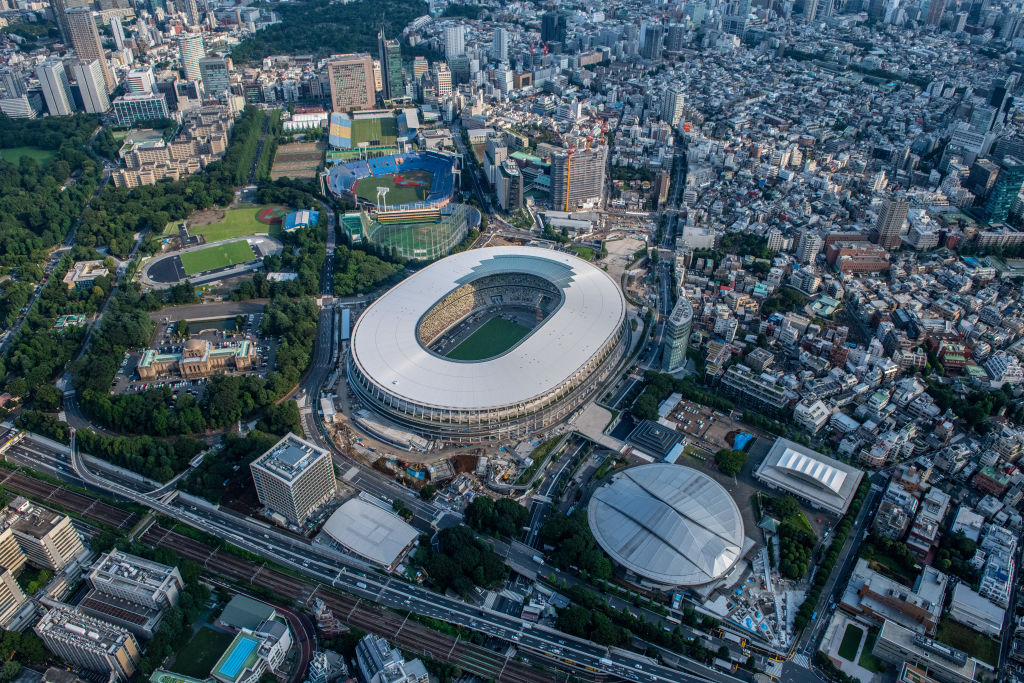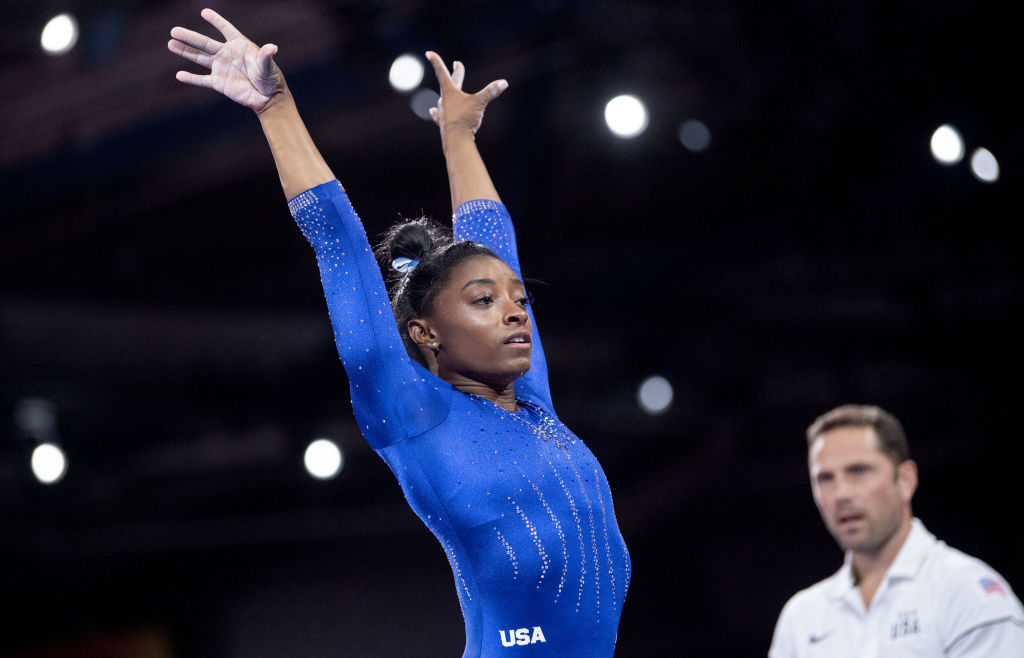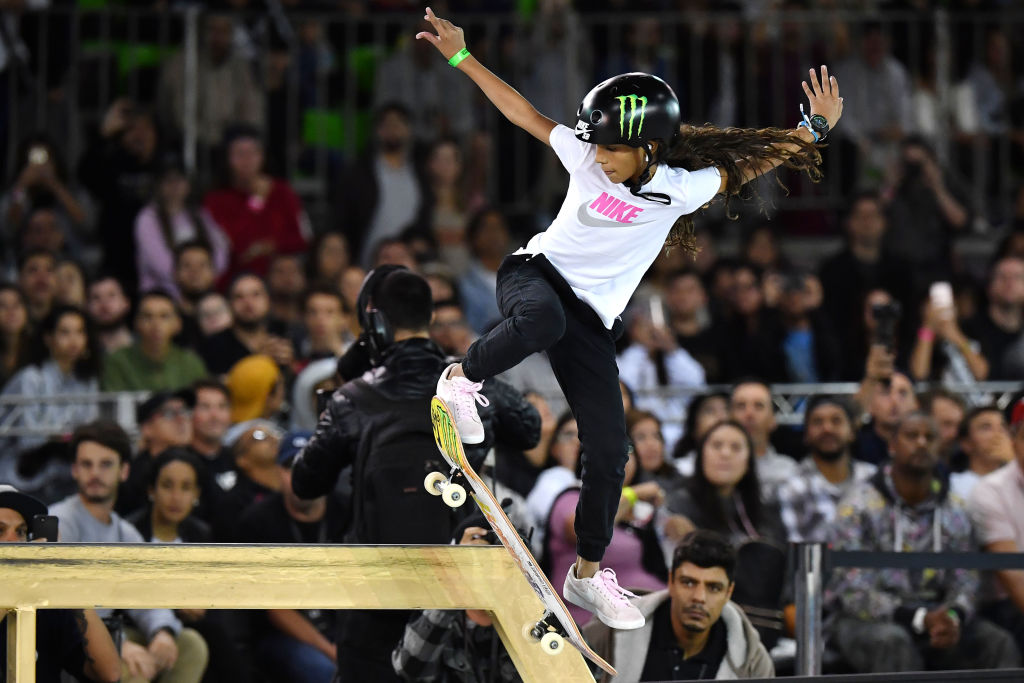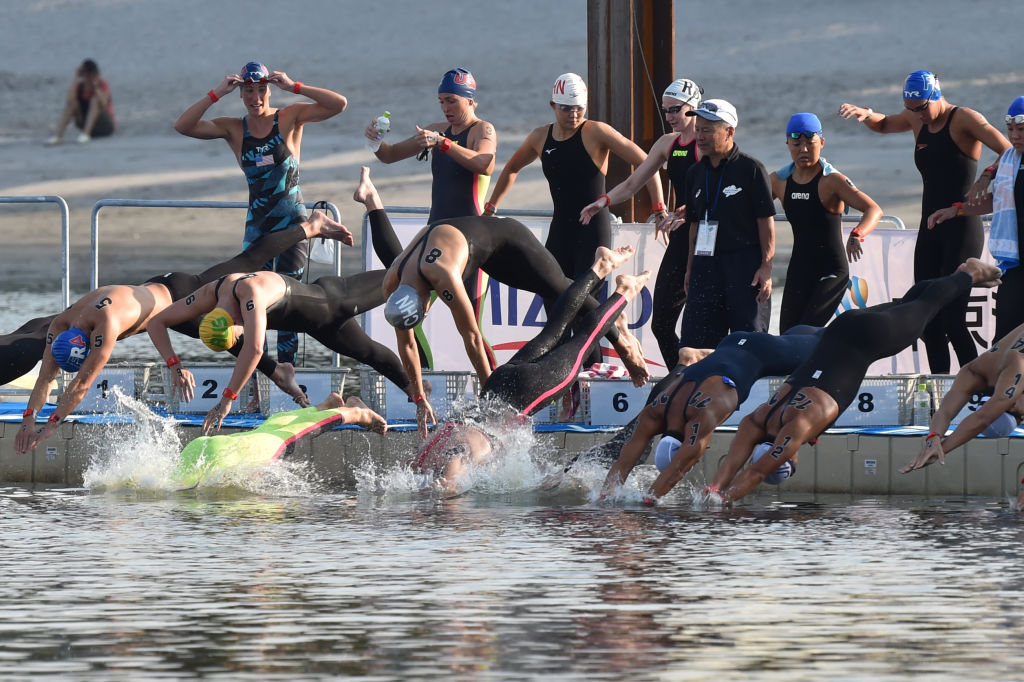For now, plans for the 2020 Summer Olympic Games in Japan’s capital of Tokyo are a bit of a question mark after the Games were officially postponed to “safeguard the health of the athletes and everyone involved” due to coronavirus.
But the International Olympic Committee has said that despite the delay, the Games will ultimately go on before summer 2021. It will be Tokyo’s second time hosting a Summer Olympics, 56 (or slightly more) years after their first time in the spotlight. And when they finally do take place, these Games will see the introduction of some exciting new sports to the lineup, too: skateboarding will make its Olympic debut, as well as karate, surfing and sport climbing.
There will be plenty of classics to watch as well, from the ever-popular swimming and gymnastics events to track and field and team sports. And while Olympic trials are up in the air for many sports, we’ll most likely be seeing the return of superstars like the 2016 gymnastics standout Simone Biles, swimming record-setter Katie Ledecky and track star Sydney McLaughlin, who was just 16 when she competed in the Rio Olympics and has been on the rise ever since.
When will the 2020 Olympics start?
The 2020 Summer Olympics were initially slated to begin on July 24, 2020 and to run until Aug. 9, 2020, with the opening ceremony on July 24 and the closing ceremony on Aug. 9. (Some preliminary events would have taken place as early as July 22.) Most of the big swimming events were set to take place over the first week, while the track and field competitions ramp up in the second half.
But on March 24, the IOC announced the Games would be officially postponed, taking place “no later than summer 2021.” They have not yet set a new date.
Where are the 2020 Olympics being held?

For the second time in its history, Tokyo is hosting the summer Olympics; they first hosted back in 1964. (Japan has also been home to two Winter Olympics, at Sapporo in 1972 and Nagano in 1998.) Tokyo is the first city in Asia to host an Olympics twice.
Ahead of the postponement announcement, Tokyo looked to many of its preexisting facilities to stage the summer’s events. The city has been renovating stadiums and rebuilding where they can: of 43 venues, 25 were already standing, while eight are new and 10 more temporary, as the Los Angeles Times reports. The Nippon Budokkan is getting fixed up as the site of judo competition and karate, for example, while the Baji Koen Park will host equestrian events and the Yoyogi National Gymnasium will be the spot for handball. (Back in 1964, it was the center of the swimming and diving events.) But the big site — the Tokyo National Stadium — has been the focus of a major overhaul. Originally, the Stadium was to be rebuilt to the specifications of a design by the late architect Zaha Hadid. That plan was scrapped due to cost concerns. The ultimate design is one by a Japanese architect, Kengo Kuma, at about half the price.
The decision on a host city for the 2020 Summer Olympics was determined back in 2013 in Argentina. The three final contenders during the bid process were Istanbul, Madrid and Tokyo; Tokyo ended up ahead with 60 votes to 36 once the field had been narrowed down to Istanbul or Tokyo. Hosting the Olympics is a complex proposition for any city: while it offers potential economic upsides, thanks to increased construction, investment and tourism, many cities also struggle to make later use of the expansive facilities and housing that the Games require.
In 1964, Tokyo was the first Asian city to host the games. They had initially been scheduled as host for 1940, but the geopolitics of the era necessitated a shift. (The 1940 games were ultimately cancelled entirely.) The 1964 Games were actually held in October, to account for Japan’s midsummer heat and September typhoon season.
What sports are in the Summer Olympics?
The 2020 Summer Olympics will award medals across 339 events, representing 33 different sports. Five are new sports entirely (baseball/softball, skateboarding, surfing, sport climbing and karate), while others — like basketball — see the inclusion of new events within the discipline. Nothing has been dropped since 2016, which also saw the return of golf and rugby.
Here is the full list of sports, and the number of events within each sport: aquatics (49), archery (5), athletics (48), badminton (5), baseball/softball (2), basketball (4), boxing (13), canoeing (16), cycling (22), equestrian (6), fencing (12), field hockey (2), football (2), golf (2), gymnastics (18), handball (2), judo (15), karate (8), pentathlon (2), rowing (14), rugby (2), sailing (10), shooting (15), skateboarding (4), sport climbing (2), surfing (2), table tennis (5), taekwondo (8), tennis (5), triathlon (3), volleyball (4), weightlifting (14) and wrestling (18).
Which U.S. athletes will likely be competing?

Simone Biles. Katie Ledecky. Sydney McLaughlin. Serena Williams. There’s still a lot up in the air about who will end up competing at the 2020 Summer Olympics — especially now that the Games have been postponed to an unspecified date, putting many athletes’ plans up in the air. Plus, many Olympic trials don’t take place until late in 2020; for track and field and swimming, for instance, trials to determine who will end up as an Olympian aren’t until June 2020, just a month before the initially scheduled Olympics themselves. Now, it’s unclear which sports will move their trials and when those will happen as the timing of the Games remains unknown.
Other sports, like many of the team events and the marathon, choose their qualified athletes based on performance in international competitions over the course of 2019 and early 2020. NBC’s Olympics-dedicated Twitter account is a good place to keep track of preliminary and qualifying events.
As for individual athletes set to take the Olympic stage? Michael Phelps, the world’s winning-est Olympian and one of the most recognizable Summer Olympics athletes, probably won’t be back; recent public appearances suggest the dad of three is content letting his record speak for itself after representing the U.S. in four consecutive Olympics. But Simone Manuel, who made waves with her gold-medal tie in 2016, is a possible 2020 Olympian, and Nathan Adrian, who is currently battling testicular cancer, might be back for round three. And then there’s Ledecky, still distance swimming’s dominant force.
On the track and field side, recognizable names like Justin Gatlin may be in contention for a spot in the competition; the former 100m-medalist from 2004 is posting top times lately. Sydney McLaughlin was the U.S.’s youngest member of the track team in 2016, and has 2020 potential. And sprinter Noah Lyles has been considered an heir to the Usain Bolt throne. Caster Semenya, meanwhile, has been a dominant force in the field — but it remains to be seen whether the 800m champion will be allowed to compete. Semenya already has two gold medals under her belt, but recently she has been battling new regulations set down by the International Association of Athletics Federations that classify her as ineligible to run in women’s races based on the increased level of testosterone she genetically possesses.
As far as gymnastics goes, Simone Biles has been breaking records at recent national and international gymnastics competitions, suggesting that she’s ready to rock for 2020. Basketball, always a Team U.S.A. highlight, might see James Harden take the court in Tokyo. And a cast of familiar soccer stars — Rose LaVelle, Megan Rapinoe and Julie Ertz — may very well have a world stage moment once more since the U.S. Women’s National Team’s 2019 World Cup victory. While USWNT star Alex Morgan is expecting her first child, due just months before the Olympics, the forward has said she hopes to still compete in Tokyo after giving birth.
Are there any changes to the Olympics this year?

The biggest change to the Olympics for 2020 is the addition of the five new sports and the return of baseball (absent in 2016), plus a few new events, like the three-on-three basketball competition.
One change sure to receive a lot of attention are the adjusted gymnastics team rules: instead of fielding a team of five athletes, each country will be whittled down to four all-around contestants, with two more teammates added to compete only in individual events.
And finally, the disruption of the coronavirus and ensuing changed timing of the Games has sent the international athletics community a curveball.
Are there any big controversies ahead of the Olympics?
The coronavirus
By mid-March, the spread of the coronavirus around the world had many wondering if the Olympics would be able to go forward as planned, as large events and gatherings — including training activities and trials — had to be canceled and postponed to abide by social distancing needs. On March 24, the International Olympic Committee announced the official postponement of the Summer Olympics, with a makeup date yet to be determined.
Concerns about costs
Olympics detractors point to rising costs as a serious concern; back in 2013, Tokyo suggested a budget of around $7 billion. That ballooned at one point to an estimated $30 billion, with organizers winnowing it down to nearer $25 billion for now. (For reference, Russia ended up spending $51 billion on the Sochi games — the highest known expenditure for an Olympics. That said, future summer games are looking at budgets below $10 billion, thanks to new regulations.)
Weather questions
Aside from the costs, there are some concerns about weather: Tokyo has seen increasingly high summer temperatures in the past few years, which means outdoor events like the marathon could be impacted. On the one-year-to-go mark this summer, the city also experienced a torrential downpour. (In 1964, the Tokyo Olympics were actually held in October to avoid these climate issues.)
USA Gymnastics
USA Gymnastics has been roiled by allegations of sexual assault against the team’s former doctor Larry Nassar in the past few years, with star gymnasts including Aly Raisman and Simone Biles speaking out about abuse and urging their governing body to take steps towards change.
Nassar pleaded guilty to seven counts of sexual assault of a minor and was sentenced in 2018 to up to 175 years in Michigan state prison, but Raisman and others have remained vocal in her criticisms of the organizations for which he worked.
Questions about Russia
Russia will most likely not compete as a nation at the 2020 Olympics, after the World Anti-Doping Agency recommended in November that the country receive a four-year ban from international competition for not cooperating with doping investigations. In January, WADA shared their suspicions that Russia had tampered with its athletes’ data before presenting it for inspection to the agency. Russia has had a fraught history with doping allegations; it has been stripped of 43 Olympic medals over the years.
Although Russia said in December that it would appeal the WADA decision, if the potential ban is upheld, Russian athletes who have not been found guilty of doping would still be allowed to compete individually. The setup would be reminiscent of the 2018 Olympics, when a select number of Russian athletes were cleared to compete at the PyeongChang Winter Olympics as OAR — the neutral “Olympic Athletes Russian” delegation.
Doping
Russia isn’t the only country facing concerns about doping among its athletes. The use of substances to enhance athletic performance has long been a fixture in modern competition, and recently superstars like Lance Armstrong have had their legacies reconsidered in light of new information about doping.
Swimming has been in focus in particular lately: in October, U.S. swimmer and prior Olympic medalist Conor Dwyer announced his retirement following a 20-month ban due to the discovery of his testosterone use. Australia’s Shayna Jack failed a drug test in July, although she contends she ingested the banned substance unknowingly.
China’s Sun Yang has been a flashpoint of the doping controversy for years: he first tested positive for banned substances in 2014, and is under investigation for smashing a vial of his blood to avoid testing in 2016. At this summer’s world championships, where he dominated in his events, several fellow competitors voiced their objections to his continued appearance in the sport.
Bribery allegations
The longtime head of Japan’s Olympic Committee, Tsunekazu Takeda, stepped down this summer after a French investigation into the choice of Tokyo as the host city for 2020 uncovered potential corruption and the use of bribes in securing votes back in 2013. Takeda has maintained his innocence, but recused himself from his Olympic roles in the face of the controversy.
Water temperature and clarity
Like in Rio in 2016, there are some concerns about the quality of the water in Tokyo Bay, which will be home to sailing events and open-water distance swimming events. In 2017, trace amounts of E. coli bacteria — 20 times the safe standard — were found in the Bay, leading to an increased focus on decontamination. And at a test event in summer 2019, the water temperature itself led athletes to admit to being overheated during their long-distance swims.
In October, the Tokyo Organizing Committee of the Olympic and Paralympic Games and the Tokyo Metropolitan Government announced that surveys of water quality and temperature in the Odaiba Marine Park showed that their attempts to improve water quality were “effective,” by using a series of underwater screens that reduced the presence of coliforms. Surveys of water temperature also suggested the temperatures on the same summer dates in 2019 were within the target.

Labor concerns
Labor organizations, including the Centre for Sport and Human Rights, have reported dangerous and problematic working conditions for construction workers contracted to build and refurbish Tokyo’s many venues, citing a “culture of fear” among workers, plus low pay and overwork, that may have led to multiple deaths so far. For its part, the IOC has said it is working closely with the U.N. agency the International Labour Organization, as the Japanese media has reported, and will be addressing the concerns “with relevant Japanese authorities.” That was in July.
How can I watch the 2020 Olympics?
As in the past, NBC should be home to 2020 Summer Olympics coverage. They will broadcast on TV and also have a home for all Olympics viewing on their Olympic Channel website, with events available to livestream. For cord-cutters, NBC apps for streaming and mobile will provide access on TVs and smart devices — but you will have to provide a cable login or buy a subscription in order to access the full coverage.
Where will the 2024 Summer Olympics be held?
The 2024 Summer Olympics will be held in Paris. And all the way out in 2028, Los Angeles will play host.
More Must-Reads from TIME
- Caitlin Clark Is TIME's 2024 Athlete of the Year
- Where Trump 2.0 Will Differ From 1.0
- Is Intermittent Fasting Good or Bad for You?
- The 100 Must-Read Books of 2024
- Column: If Optimism Feels Ridiculous Now, Try Hope
- The Future of Climate Action Is Trade Policy
- FX’s Say Nothing Is the Must-Watch Political Thriller of 2024
- Merle Bombardieri Is Helping People Make the Baby Decision
Write to Raisa Bruner at raisa.bruner@time.com